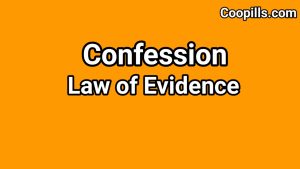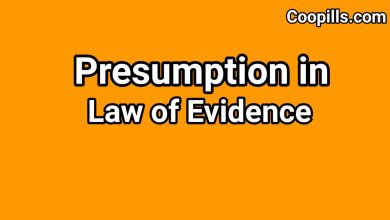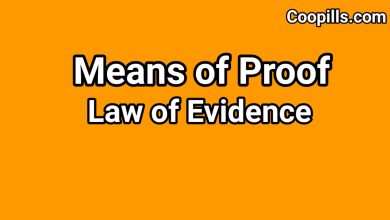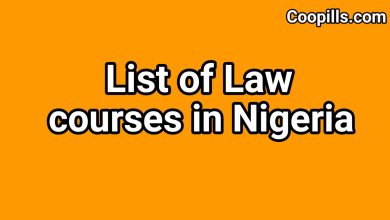Admission And Confession
Table of Contents
In this article we shall be looking at Admissions and confessions.

Admission and confessions
Admission: an admission is simply a confession to an alleged fact. In ordinary parlance, it is possible to admit a fact without conceding it.
Types of Admission
1- Formal admissions
2- Informal admissions
Formal Admissions:
These are admission contained in pleading pending litigation. The fact so admitted in the pleading are usually taken as established without any further proof.
Informal admission:
By virtue of S.19 Evidence act, an informal admission is a statement, oral or documentary, which suggests any inference as to any fact in issue or relevant fact made by any person and in any of the circumstances contained in s.21-23 of the evidence act.
Person who can make admissions
(a) party to proceeding: by virtue of S.24 such
admission are relevant and admission against the person making but not in his favour.
(b) an agent of a party to a procceding: By S.21 (i)the evidence act recognized that an agent may under certain circumstance make admission which will bind his principal.
(c) A person suing or sued in representative capacity: by virtue of S.21(2), this category of admission will be valid if it was made by him at the time he was acting in that character.
(d) person having proprietary or pecuiniary interest: provided the admission was made in the character of a person having such an interest. See S.21(3)(a)
(e) Predecessor in title: Provide the admission was made during the subsistence of such an interest – S.21 (2)(b).
(f) Admissions by person whose position must be proved as against a party to a suit: Under S.22, where it is necessary to show the position or liability of X as Against A in a suit
between A and another, any statement would be relevant as against X had a suit been brought against him, provided he made the statement at the time he occupied such position or was subject to such liability.
(g) Admission by person expressly referred to by a party to a suit:
This is provided for by S.23 Evidence Act. Under this section, any statement made by a person to whom a party to a matter in dispute, is an admission. Although a legal practitioner can make a formal admission on behalf of his
client, he cannot do so In the case of an informal admission.
An admission by a wife cannot bind her husband and vice versa, unless the relationship between them comes within one of those discussed above.
Aside from the forgoing exceptions, an admission is admissible in evidence party. See stanza v. Attah (1999) 3 NWLR Pt.596 @647.
Confession
:
A confession is defined as a statement made by any person charge with a crime at any time stating or suggesting the inference that he committed the offence. See S.28 E.A. 2011; See Ikemson v. The State (1989) 3 NWLW pt.110 @ 455.
Confessional statements
Confessional Statement are usually the best means by which criminal cases are established. There must however be no controversy of any soft as to whether or not it was voluntary made. It will be admissible against the person who made it only-S.29(2).
The courts have held that conviction for any crime may be based on a single confession if
voluntary made.
Voluntary confession
unlike the repealed evidence Act, the new act gave conditions that make confession was evaded. The onus of proving affirmatively beyond reasonable doubt that a confession is voluntary rests on prosecution.
There is no basis therefore for the practice by some Nigerian courts to fall back on English common law in deciding that is voluntary confession. It is submitted that the proper approach is to hold that any confession that does not come within any of these conditions listed in S.29(2) will be relevant and admitted under S.29(2) as being voluntry.
A cursory look at S.29 (a&b) show a numbers of key points that require closer examination.
1. Oppression: An inducement need not be aimed at making the accused speak the truth in a case, suffice if he is intimidated to make a statement at all by persons in authority.
2. Threats: Any confession statement obtained consequent upon the use or the threat of the use of actual violence to the body of the accused, will be deemed to be vitiated.
Trial Within A Trial
If in the course of trying an accused person he objects through his counsel to the admission of a confessional statement on the ground that it was extracted from him by force, the trial judge will at once be voluntariness or otherwise of the said statement. See Obidiozo vs The State (1987) 4 NWLR Pt.67 @748.
Judges rule and its application in Nigeria
In England, the manner in which the police should take evidence from persons connected with crimes was dealt with in the judges rules. These rules, which were first formulated in 1912 and modified in 1964 at the request of the home office for the guidance of the police, has as its aim that was held out in R. Vs Voisin (1981) 1 K.B. 531 at 539 thus;
“These rules have not the force of law, they are
administrative directions, the observance of which the police authorities should enforce upon their subordinates as tending to the fair administration of justice”.
They are the rules of administrative practice and not rule of law, hence the mere failure to observe any of them in the
talking of a statement from a person charged with the commission of an offence will not necessarily render the statement in evidence inadmissible. See R. Vs Day (1952) 36 CAR 92.
A brief examination of the 1964 judges will be instructive.
1. When a police officer is trying to discover whether or by whom an offence has been committed, he is entitled to question any person, whether suspected or not, from whom he thinks that useful information will be obtained.
2. As soon as the person has committed an offence, he shall caution the person before putting to him any question relating to the offence.
The cautionary words shall be as follows:
“You are not obliged to say anything unless you wish to do so but what you say may be put into writing and given in evidence;
Therefore, a record shall be kept of the time and place at which any such questioning or statements began and ended and of the person present.
3. Where a person is charged or informed that he may be prosecuted for an offence, he shall be cautioned in the following terms:
“Do you wish to say anything? You are not obliged to say anything unless you wish to do so but whatever you say will be taken down in writing and may be given in evidence”.
4. The other rules relates to written statement made after caution and the mode in which such statements must be recorded.
Official and privileged communication
Generally, every person is competent to give evidence and may be compellable. However, under certain circumstances, a person may be able to claim privilege from answering certain questions. A witness can claim the privilege or a counsel can make a claim on his behalf. Sometimes, the judge tells the witness that he need not answer the particular question. Thus, this privilege is a rule of exclusion. The rationale behind such privileges is to protect state security or the sanctity of marriage or the privacy of an individual or exclusion of some facts on grounds of public policy and morality.
There is paucity of reported Nigerian cases in this area of law.
This is so because most claims for privileges are usually by way of interlocutory applications.
The following are the official and privileged communications provided by the Act:
(a) communications during marriage
(b) Judges, magistrates and jurors
(c) Information as to the commission of an offence
(d) Affairs of state
(e) Professional communications
(f) Production of title deeds and other documents
(g) Privilege against self incrimination
(h) Statements made without prejudice.







